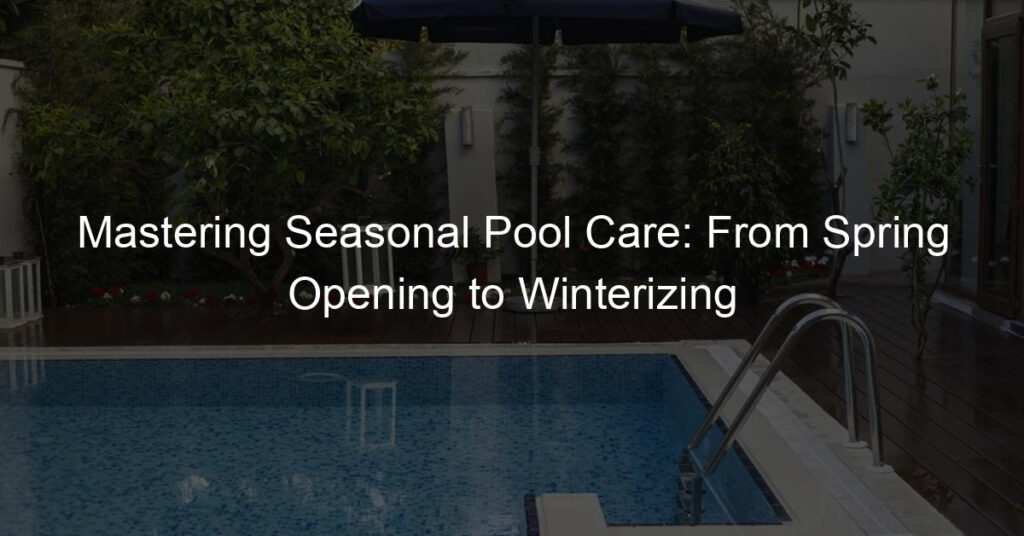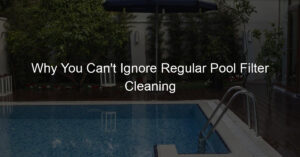Introduction to Seasonal Pool Care
Having a pool at home is a great way to cool off during the hot summer months. However, it’s important to remember that your pool requires regular maintenance to keep it clean, safe, and enjoyable. In this guide, we will explore the importance of pool maintenance and provide an overview of seasonal pool services.
- Understanding the Importance of Pool Maintenance
Pool maintenance is crucial for several reasons. First, it helps keep your pool water clean and clear, which is essential for your health and safety. Dirty pool water can harbor harmful bacteria and algae, which can cause skin irritations and other health issues. Second, regular pool maintenance can extend the life of your pool and its equipment, saving you money in the long run. Lastly, a well-maintained pool enhances the aesthetic appeal of your home, making it a more enjoyable place to relax and entertain guests.
- Overview of Seasonal Pool Services
Seasonal pool services are designed to keep your pool in top condition throughout the year. These services typically include:
- Spring Pool Opening: This involves removing the pool cover, cleaning the pool, balancing the water chemistry, and preparing the pool equipment for the swimming season.
- Summer Pool Maintenance: Regular cleaning and chemical balancing are crucial during the summer months when the pool is in heavy use.
- Fall Pool Care: As the swimming season winds down, it’s important to clean the pool and adjust the water chemistry to prepare for the winter months.
- Winter Pool Closing: This includes cleaning the pool, lowering the water level, adding winterizing chemicals, and covering the pool to protect it from harsh winter weather.
In conclusion, seasonal pool care is essential for maintaining a clean, safe, and enjoyable swimming environment. By understanding the importance of pool maintenance and utilizing seasonal pool services, you can ensure that your pool remains in top condition year-round.
Spring Pool Opening
As the snow melts and the temperatures rise, it’s time to prepare your pool for the spring season. This process involves several key steps to ensure your pool is clean, safe, and ready for use. Let’s dive into the details.
Preparing Pool for Spring
The first step in preparing your pool for spring involves a series of tasks that are crucial for maintaining the health and longevity of your pool. These tasks include:
- Removing the pool cover: After a long winter, your pool cover may have accumulated leaves, debris, and water. Carefully remove the cover, clean it, and store it properly for the next winter season. Remember, it’s easier to clean the cover while it’s still on the pool.
- Cleaning and checking the pool: Once the cover is off, it’s time to clean the pool. Use a pool skimmer to remove any floating debris. Then, inspect the pool for any visible damage. Look for cracks, leaks, or signs of wear and tear. If you spot any issues, it’s best to address them immediately.
- Adjusting water levels: After cleaning and inspecting, you’ll need to adjust the water levels. The water level should be at the center of your pool skimmer or pool tile for optimal operation. You can add water using a garden hose until it reaches the desired level.
- Starting the pool filter system: Now it’s time to start the pool filter system. This will circulate the water and help to keep it clean. Make sure to prime the pump before starting the filter system to avoid any damage. If you’re unsure about this step, consider consulting with a pool professional.
Preparing your pool for spring might seem like a daunting task, but with careful planning and a little elbow grease, you can ensure your pool is ready for the warm days ahead. Remember, a well-maintained pool is not only more enjoyable but also safer for everyone.
Spring Pool Care Tips
When it comes to maintaining your pool during the spring season, there are three key areas to focus on. These include maintaining the water balance, regular pool cleaning, and monitoring pool equipment. Let’s delve into each of these areas.
- Maintaining Water Balance
One of the most important aspects of pool care is maintaining the water balance. This involves ensuring the pH, alkalinity, and calcium hardness levels are in the correct range. A well-balanced pool has a pH level between 7.2 and 7.8, alkalinity between 80 and 120 parts per million (ppm), and calcium hardness between 200 and 400 ppm. Regular testing of your pool water will help you maintain these levels and keep your pool safe and clean.
- Regular Pool Cleaning
Regular pool cleaning is another crucial aspect of spring pool care. This includes skimming the pool surface to remove leaves and other debris, brushing the pool walls and floor to prevent algae buildup, and vacuuming the pool to remove any settled debris. A clean pool not only looks good but also helps maintain the efficiency of your pool equipment.
- Monitoring Pool Equipment
Lastly, monitoring your pool equipment is essential to ensure it’s working properly. This includes checking the pool pump and filter system for any signs of wear or damage, and ensuring the pool heater is functioning correctly. Regular maintenance of your pool equipment can help prevent costly repairs in the future.
| Pool Care Tips | Description |
|---|---|
| Maintaining Water Balance | Ensure pH, alkalinity, and calcium hardness levels are in the correct range. |
| Regular Pool Cleaning | Skim, brush, and vacuum the pool regularly to keep it clean and efficient. |
| Monitoring Pool Equipment | Check pool pump, filter system, and heater regularly for any signs of wear or damage. |
By following these spring pool care tips, you can ensure your pool stays clean, safe, and ready for use throughout the season. Remember, a well-maintained pool is the key to a great swimming experience!
Summer Pool Maintenance
When the summer season arrives, it’s time to enjoy the cool waters of your swimming pool. But, to ensure a safe and enjoyable swimming experience, it’s crucial to maintain your pool properly. Let’s discuss some essential summer pool maintenance tasks.
Swimming Pool Care in Summer
During the summer, your pool requires more attention due to increased usage and higher temperatures. Here are the top three tasks you should focus on:
-
Regular cleaning and skimming
Regular cleaning is vital to keep your pool water clear and free from debris. Skim your pool daily to remove leaves, bugs, and other floating debris. Once a week, brush the sides and bottom of the pool to prevent algae buildup. A clean pool not only looks good but also ensures a healthy swimming environment.
-
Checking pool chemicals
Chemical balance is crucial for your pool’s health. Test your pool water at least once a week to ensure it has the right levels of chlorine, pH, alkalinity, and calcium hardness. An imbalance in these chemicals can cause skin irritation, cloudy water, and damage to your pool equipment.
-
Maintaining the pool filter system
Your pool’s filter system plays a significant role in keeping the water clean. Regularly check and clean the filters to ensure they are working efficiently. A well-maintained filter system can help prevent common pool problems like cloudy water and algae growth.
Remember, a well-maintained pool is the key to a fun and safe summer swimming experience. By following these simple steps, you can enjoy your pool all summer long without any worries.
Common Summer Pool Problems
During the summer, your pool can face a few common problems that may disrupt your swimming plans. Let’s take a closer look at these issues:
- Algae Growth
- Cloudy Water
- Equipment Failure
Algae are tiny plants that can grow rapidly in your pool, turning the water green and making surfaces slippery. They thrive in warm, sunny conditions, making summer a prime time for algae blooms. Regular cleaning and proper chemical balance can help prevent algae growth.
Cloudy water is another common summer pool problem. It can be caused by several factors, including improper chemical balance, high swimmer load, or poor filtration. Regular testing and adjustment of pool chemicals can help keep the water clear and safe for swimming.
Pool equipment, such as pumps and filters, can fail due to regular wear and tear, especially during the heavy use of summer months. Regular maintenance and timely repairs can help keep your pool equipment in good working order.
Understanding these common summer pool problems can help you take proactive steps to prevent them and keep your pool clean and safe for swimming all summer long.
Fall Pool Care
As the leaves start to change color and the air turns crisp, it’s time to prepare your pool for the winter months. This process, known as winterization, is crucial to maintaining the longevity and functionality of your pool. Here are the three main steps to prepare your pool for winter.
Preparing Pool for Winter
- Reducing Water Levels
- Adding Winterizing Chemicals
- Covering the Pool
As the first step in winterizing your pool, it’s important to lower the water level. This prevents damage from freezing water, which can expand and crack your pool’s walls or plumbing system. The water level should be reduced below the skimmer mouth, but not more than 4-6 inches.
Next, it’s time to add winterizing chemicals to your pool. These chemicals help keep the water clean and clear during the winter months, preventing algae growth and maintaining the pH balance. A typical winterizing kit includes a shock treatment, an algaecide, and a stain prevention product. Always follow the manufacturer’s instructions when adding these chemicals to your pool.
Finally, once the water level has been reduced and the chemicals have been added, it’s time to cover your pool. A good pool cover protects your pool from debris, such as leaves and twigs, and helps to maintain the chemical balance. Make sure your cover fits securely and is anchored properly to prevent it from blowing away in strong winds.
By following these steps, you can ensure that your pool is well-prepared for the winter months. This not only makes it easier to reopen your pool in the spring, but also helps to extend the lifespan of your pool and its equipment.
Fall Pool Maintenance Tips
As the leaves begin to change color and the air turns crisp, it’s time to start thinking about fall pool maintenance. Here are some key tips to keep your pool in top shape during the autumn months.
-
Regular Pool Cleaning
Regular pool cleaning is a crucial part of fall pool maintenance. As the leaves fall, they can end up in your pool, potentially causing blockages and other issues. Make sure to skim your pool regularly to remove leaves and other debris. You should also brush the sides and bottom of your pool to prevent algae growth. A clean pool is not only more enjoyable to swim in, but it also makes the winterizing process easier.
-
Checking Pool Equipment
Another important aspect of fall pool maintenance is checking your pool equipment. This includes your pump, filter, heater, and any other equipment you may have. Make sure everything is working properly and fix any issues as soon as possible. This will help ensure your pool is ready for the colder months ahead and can prevent more costly repairs in the future.
-
Preparing for Winterizing Swimming Pool
Finally, fall is the time to start preparing your pool for winter. This includes reducing water levels, adding winterizing chemicals, and covering the pool. By starting this process in the fall, you can ensure a smoother transition when winter arrives. Remember, a well-prepared pool in the fall makes for an easier pool opening in the spring.
By following these fall pool maintenance tips, you can ensure your pool stays in great condition throughout the fall and is ready for the winter months. Remember, a little maintenance now can save a lot of time and money in the future.
Winter Pool Closing
As the winter season approaches, it’s crucial to properly close your pool to protect it from potential damage caused by freezing temperatures. This process, known as winterizing, involves several key steps.
Winterizing Swimming Pool
Winterizing your swimming pool is a vital part of pool maintenance. It involves three main steps:
- Draining Water from Pool Equipment
- Adding Winterizing Chemicals
- Securing the Pool Cover
Firstly, it’s important to drain the water from your pool equipment. This includes the pump, heater, and filter. If water remains in these components, it can freeze and cause damage. To drain the water, you’ll need to turn off the pool pump and open the drain plugs. Remember to store the plugs in a safe place so they don’t get lost.
Next, you’ll need to add winterizing chemicals to the pool water. These chemicals help to balance the water chemistry and prevent algae growth during the winter months. The most common winterizing chemicals include algaecide and chlorine. Always follow the manufacturer’s instructions when adding these chemicals to your pool.
Finally, secure the pool cover over your swimming pool. This cover helps to keep out debris and protect your pool from the harsh winter weather. Make sure the cover is tightly secured to prevent it from blowing off in strong winds. You can use water bags or weights to help hold the cover in place.
By following these steps, you can ensure that your pool is well-protected during the winter months. Then, when spring arrives, you’ll be able to easily open your pool and enjoy it once again.
Winter Pool Care Tips
Even during the cold winter months, your pool requires some attention. Here are some essential tips to help you maintain your pool during winter:
- Checking the Pool Cover
- Monitoring Water Levels
- Preparing for Spring Pool Opening
It’s crucial to regularly check your pool cover during winter. The cover protects your pool from debris and harsh weather conditions. Make sure it’s secure and free from damage. If you notice any tears or holes, repair them immediately to prevent debris from entering the pool. Also, remove any snow or water that accumulates on the cover. Too much weight can cause the cover to sag or even tear.
Keeping an eye on your pool’s water level is another important winter pool care tip. If the water level gets too low, it could damage the pool cover. On the other hand, if the water level is too high, it could lead to freezing and potential damage to the pool walls. The water level should be kept at the middle of the skimmer opening for optimal results.
Winter is also the perfect time to start preparing for the spring pool opening. This includes checking your pool equipment, such as the pump, filter, and heater, for any potential issues. Also, consider ordering any necessary supplies early, like chemicals and testing kits, so you’re ready when spring arrives. Remember, a little preparation now can save you a lot of time and hassle when it’s time to open your pool.
In conclusion, winter pool care is all about regular checks and early preparation. By following these tips, you can ensure your pool remains in good condition throughout the winter and is ready for use as soon as the weather warms up.
Conclusion: Mastering Seasonal Pool Maintenance
As we wrap up our comprehensive guide on seasonal pool care, it’s important to remember the key points we’ve discussed. Proper pool maintenance is not just a once-a-year task, but a year-round commitment. Let’s take a moment to recap what we’ve learned.
- Recap of seasonal pool care guide: We started with spring pool opening, where we discussed the importance of cleaning, balancing water chemistry, and preparing your pool equipment. Then we moved onto summer maintenance, which involves regular cleaning, checking water levels, and ensuring the pool’s pH is balanced. In fall, we covered the need to remove leaves and debris, balance water chemistry, and prepare the pool for winter. Finally, we discussed winter pool closing, which involves covering the pool, reducing water levels, and winterizing the pool equipment.
- Importance of regular pool maintenance: Regular pool maintenance is crucial to keep your pool safe, clean, and enjoyable. It prevents algae growth, maintains water balance, and prolongs the lifespan of your pool equipment. Remember, a little effort throughout the year can save you from costly repairs and health issues.
- Benefits of professional seasonal pool services: While pool maintenance can be a DIY task, hiring a professional pool service has its advantages. Professionals have the expertise to handle complex tasks, they can spot potential issues before they become major problems, and they can save you time and effort. Plus, they can provide you with peace of mind knowing your pool is in good hands.
Mastering seasonal pool maintenance is an achievable goal. With the right knowledge and a bit of effort, you can maintain a sparkling clean pool that your family can enjoy all year round. Remember, a well-maintained pool is more than just a luxury, it’s a commitment to health, safety, and fun.














